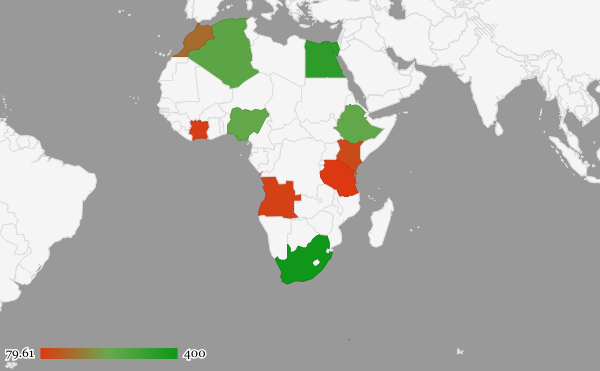Africa is the fastest-growing continent after Asia in 2024, even as the gross domestic product is expected to hit 3.8% and 4.2% in 2023 and 2025, respectively. The African Development Bank’s first quarter of its annual macroeconomic report on African Economic Outlook revealed that eleven of the world’s 20 fastest-growing economies are set to outpace the forecasted economic performance in the coming years.
The global and regional challenges, including rising geopolitical tensions, political instability, and regional conflicts and pandemics, continue to cause economic hurdles on the continent as trade, employability, and investment remain low and shattered.
South Africa is the richest country by GDP of US$373.23 billion, with a resilient gross domestic growth of 4.2 percent in the last year. With only a population of 70 million, the country has a GDP per capita of US$ 5.97 thousand. Egypt is the second-largest economic giant in Africa, with an annual GPD growth of 3.5 percent. Egypt has a GDP of US$347.59 and a GDP per capita of US$1.9 thousand.
Algeria, Ethiopia, Morocco, Kenya, and Angola are ranked as the economic giants of Africa in 2024 in that order, after South Africa and Egypt. Ivory Coast and Tanzania have a GPD of US$92.12 and 79.61, respectively, after Angola.
However, there is much hope in the steady growth and resilience of African economies amid the vulnerabilities linked to global market shocks. The continent’s economic courses are less diversified, and there is a need to stretch into other areas of production to mitigate the rising cost of living and unemployment rate.
Despite the economic progress, sub-Saharan Africa has one of the highest inequality rates in the world. Access to basic education and health is still dire for children, whose parents are unable to tweak through the income constraints.
The continent remains the worst hit in the post-pandemic era as the inflationary rate wreaks havoc on most households despite cooling down by a small margin in the past year. Access to credit is strenuous for small businesses due to the rising lending interest rates of the local banks.
It’s also worth noting that corruption has been the hardest nut to crack in most African countries, which is the biggest barrier to equitable development. Lack of independent institutions to enforce anti-corruption policies is a potential weak link to public resource misuse, further exacerbating poverty and inequality.







